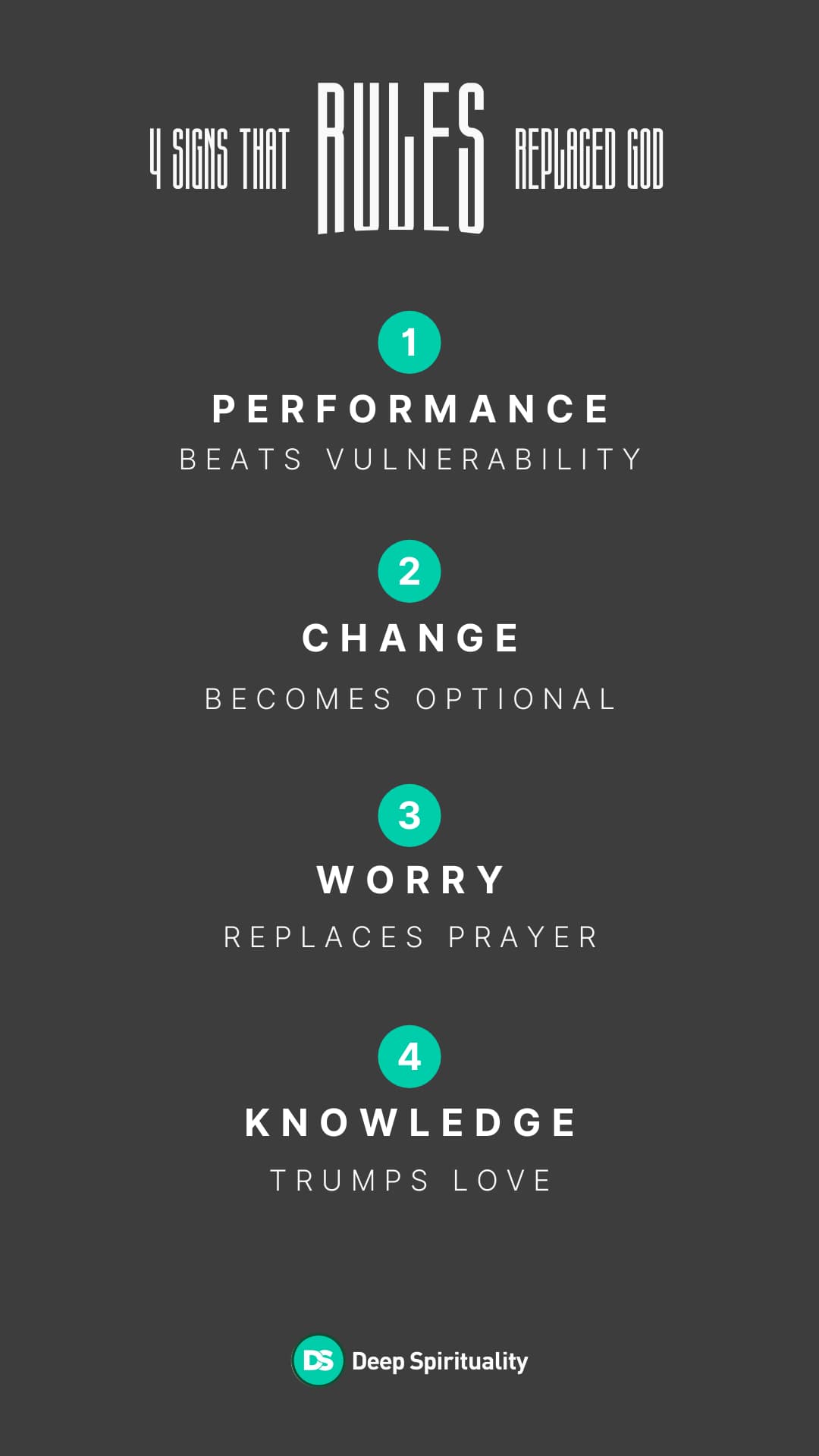Table of Contents
Contents
I only went to church a handful of times growing up.
The rules and theatrics largely deterred me (Jynette). What I didn’t understand at the time was that I was witnessing people living out rule-based Christianity.
Why would they do that to themselves?
I have been a Christian for 20+ years and have both observed and fully participated in rule-based Christianity. It’s given me a better understanding of the temptation to replace a relationship with God with rules.

Just like in any relationship, we can get selfish and let contempt creep in. We can get disappointed and then start to protect ourselves, creating distance in the relationship.
In a relationship with God, we face these same challenges as well. In these moments, we can either settle for remaining religiously connected (rules) or fight to be righteously connected to Him (heart).
Let’s talk about some of the rules that can begin to replace what may have started out as a genuine connection with God. There are two routes we can take when rules have replaced God in our life:
- Becoming behavioral Christians
- Becoming humanistic Christians
A little hint: neither of them works well.
Behavioral Christians merely clock in and out when it comes to their relationship with God. We can be satisfied with just showing up, as long as we are checking the boxes of reading our Bibles, praying, confessing a “little” sin to appease our consciences, and doing our good Christian deeds (weekly/monthly).
Then there are humanistic Christians. Leaving God out of the equation, they attempt to will their way into following whatever spiritual rules they deem worthy.
They can cover up their boredom with the Bible by reading “spiritual” books for their quiet times. Their primary goal can be to achieve status as a good, moral person, but they have lost interest and inspiration in their relationship with God.
We have been in both categories at various points in our lives and have identified multiple indicators that we are following rules. We will focus here on four signs that rules have replaced God in your life.

Performance is prioritized over vulnerability
9 Jesus taught this parable to those who were convinced they were morally upright and those who trusted in their own virtue yet looked down on others with disgust: 10 “Once there were two men who went into the temple to pray. One was a proud religious leader, the other a despised tax collector.
11–12 The religious leader stood apart from the others and prayed, ‘How I thank you, O God, that I’m not wicked like everyone else. They’re cheaters, swindlers, and crooks—like that tax collector over there. God, you know that I never cheat or commit adultery; I fast from food twice a week and I give you a tenth of all I make.’
13 “The tax collector stood off alone in the corner, away from the Holy Place, and covered his face in his hands, feeling that he was unworthy to even look up to God. Beating his breast, he sobbed with brokenness and tears saying, ‘God, please, in your mercy and because of the blood sacrifice, forgive me, for I am nothing but the most miserable of all sinners!’
14 “Which one of them left for home that day made right with God? It was the humble tax collector and not the religious leader! For everyone who praises himself will one day be humiliated before all, and everyone who humbles himself will one day be lifted up and honored before all.”
Luke 18:9-14 (TPT)
The religious leader’s arrogance was primarily rooted in how he measured up to the “sinful” people around him.
Thanking God that he was not wicked like everyone else, his focus was on what they did wrong and everything he was doing right. He didn’t even fathom or consider any areas in his life or heart that he needed to change.
His pride blinded him from the realities of his weaknesses and sins as he boasted about his flawless performance. As mentioned earlier, the religious replace vulnerability with performance.
On the other hand, the tax collector felt unworthy. He was vulnerable with God about his sins and willingly expressed his need for mercy. He did not compare himself with anyone else because he was busy working on his own weaknesses.
And we know he could have certainly found other tax collectors or “sinners” worse than him, but he instead chose to prioritize vulnerability with God over his performance.
Although the religious leader appeared confident and the tax collector seemed like a “mess,” the scripture clarifies that the latter walked away right with God. God responds to vulnerability born out of humility, and that’s what the tax collector demonstrated in his prayer.
Pause and reflect
- Who do you most relate to in this story?
- Do you spend more time comparing yourself to others or evaluating your spiritual condition?
- How vulnerable are you in prayer?
Change becomes optional
He has been very kind and patient, waiting for you to change, but you think nothing of his kindness. Perhaps you do not understand that God is kind to you so you will change your hearts and lives.
Romans 2:4 (NCV)
Have you ever had a friend who kept mooching off you, promising to pay you back but never getting around to it?
They could change and decide to be a good friend and pay you back, but instead, they don’t care enough about their relationship with you to change.
Have you considered that more often than not, we treat God in the same way? Romans 2:4 says that God’s kindness is meant to lead us to repentance (a changed heart/life).
Behavioral Christianity can be very deceiving when we focus on religious activities, find ourselves busy doing a lot of “good things”, and then just feel good about ourselves. But if we take a step back and evaluate our lives, we are not changing.
Even worse, we can make the excuse that God is kind, and we bank on the promise that he is full of grace and mercy. We say things like, “He knows my heart, and he understands” or “I’ll get around to changing.”
However, we never get around to it. We let change become an option instead of a necessity.
While God is indeed gracious and merciful, he isn’t a pushover, nor is he someone we can take advantage of or trick. He is kind to us, hoping and expecting we will respond to his love by changing.
Check out this scene from Les Miserables:
The main character deserved to be imprisoned, but instead, he was shown the kind of mercy that ultimately transformed his life. This scene is an excellent illustration of how God shows us kindness and how he wants us to respond to it.
Pause and reflect
- Is change an option or a necessity in your life?
- What are some examples of God’s kindness in your life that should motivate you to change?
- What change in your life have you been resisting or made optional?
Worry replaces prayer
6 Don’t be pulled in different directions or worried about a thing. Be saturated in prayer throughout each day, offering your faith-filled requests before God with overflowing gratitude. Tell him every detail of your life.
Philippians 4:6-7 (TPT)
Prayer is also an opportunity to draw us closer to God, especially when we let him in on every detail of our life. And anyone who has obeyed this passage can attest to that not being easy.
Telling God every detail of our life means telling him the good, the bad, and the ugly. It means revealing the areas of our life where we feel like a mess.
When we avoid making this kind of spiritual effort in prayer, worry can quickly become the dominant force in our life that distracts us from God.
Instead of praying, we just worry, plot, and plan during our “prayers.” We allow our worries to pull us in different directions. Sometimes, we can even see worry as an asset that helps us be productive.
Here are some specific ways I can replace prayer with worry:
- I have “worry walks” instead of prayer walks…
- I have “planning walks” that I call prayer walks…
- I have “self-talks” instead of a conversation with God…
- I journal my emotions to myself instead of writing to God…
- I have prayer times that get interrupted with my task list…
- I shorten my prayer to get to my to do list…
Can you relate to any of these?
Chronic worry is a sure sign we aren’t praying enough. Without deep and consistent prayer, worry can be a powerful force that distances us from God.
Instead of seeing that we have a very powerful creator on our side, we take matters into our own hands, which often leaves us burdened and overwhelmed.
Pause and reflect
- How do you replace prayer with worry?
- What details of your life do you need to begin praying about?
- What would it look like for you to be saturated in prayer? What would have to be different about your prayer life?
Head knowledge trumps love
8 Now I will write about meat that is sacrificed to idols. We know that “we all have knowledge.” Knowledge puffs you up with pride, but love builds up. 2 If you think you know something, you do not yet know anything as you should. 3 But if any person loves God, that person is known by God.
1 Corinthians 8:1-3 (NCV)
This scripture helps us understand that if our primary goal is simply to have knowledge, we can fall into the trap of being puffed up with pride.
The acid test of a genuine relationship with God is shown in our ability to love (Matthew 22:36-40; 1 Thessalonians 4:9-10; 1 John 4). In this passage above, it says that anyone who loves God is known by God. To be known means it’s personal, intimate, and deep.
For anyone who plays basketball, you know the difference between players who dress the part and players who could actually play.
I (Martin) remember playing in the park one day as a freshman or sophomore in high school, and a guy I did not know came onto the court. My friends and I had nice shoes (Jordans), nice shorts, and nice jerseys, but he didn’t have any of that.

I looked at him thinking, “Can this guy even play?”. However, once the game started, it became apparent very quickly that he was the real deal. He dominated all of us and taught us a good lesson that day – “Don’t judge a book by its cover.”
The above story is a good illustration of what it feels like when a Christian has a lot of head knowledge but doesn’t live a life of love.
We had the nice clothes, but he had the right game. Knowing and quoting scriptures but being unwilling to love others is a sure sign we are replacing God with rules. All over the Bible, it’s evident that love is a top priority for God, which means this should be the top priority for anyone who wants a relationship with Him.
Pause and reflect
- What do you prioritize – head knowledge or growing in your love?
- Who needs your love today?
How to get your spiritual groove back
Now that we have identified signs of replacing God with rules, it’s time to dive into getting back our spiritual groove by avoiding rules and focusing on the heart. This is the kind of Christianity that changes us and inspires others.
Remember your “why”
9 For I am the least of all the apostles. In fact, I’m not even worthy to be called an apostle after the way I persecuted God’s church. 10 But whatever I am now, it is all because God poured out his special favor on me—and not without results. For I have worked harder than any of the other apostles; yet it was not I but God who was working through me by his grace.
1 Corinthians 15:9-10 (NLT)
When I think of getting my spiritual groove back, it makes me think about people renewing their marriage vows.
When you first get married, it can be like a romantic comedy ending with the couple falling in love, getting married, and dramatically listing off all of the reasons why they love each other. If we are lucky enough, they’ll make a second movie showing the couple being in a rut and doing the hard work to be head over heels in love again.
Often, we need to do that with God by remembering our “why,” which is the very reason we get out of bed in the morning in pursuit of a deeper connection with God.
Paul remembered how God poured out his special favor on him. He remembered his “why,” and as a result, he went to work. This was his motivation to endure, work hard, tell others about God, forgive, etc.
Do you remember the feeling of God’s special favor in your life? Maybe you have never experienced that? If so, it’s worth seeking a relationship with God to discover your “why”.
Remembering our “why” inspires us to throw out the rules and re-engage in a relationship with God.
Find a quiet place
As the deer pants [longingly] for the water brooks, So my soul pants [longingly] for You, O God. 2 My soul (my life, my inner self) thirsts for God, for the living God. When will I come and see the face of God?
Psalm 42:1-2 (AMP)
This psalm expresses a strong desire and longing to connect with God. No one needs to push, force, or keep the Psalmist accountable to spend time with God. He is self-motivated to connect with God.
I (Martin) have a strong desire to watch anything going on with the San Antonio Spurs. They are my favorite NBA team. I tell my friends that I bleed black & silver (sorry, I am not talking about the Raiders). I can’t wait to watch the games, interviews, and anything else Spurs-related.
This is the kind of passion we should have when we think about spending time with God.
A quiet place is somewhere you can go where you have uninterrupted space and time to focus on God.
I connect with God outdoors. Most mornings, I look forward to heading outside in nature and praying. Prayer walks are where I can unload all of my cares and worries with God.

On the flip side, my wife’s quiet place is on the patio or in our room. She is happy to see me go so that she has the space to herself.
When you want to rekindle your relationship with God, you have to find your quiet place where you can candidly tell God everything on your heart and mind.
Feed on the Word
But Jesus told him, “No! For the Scriptures tell us that bread won’t feed men’s souls: obedience to every word of God is what we need.”
Matthew 4:4 TLB
Just like we need food to survive physically, we need to feed on God’s Word to survive spiritually.
Feeding on God’s words is the equivalent of us listening to him. Getting rid of a rule-based relationship happens when we are hungry to hear from God. We see his words as a necessity in our lives again.
If you give these instructions to the believers, you will be a good servant of Christ Jesus, as you feed yourself spiritually on the words of faith and of the true teaching which you have followed.
1 Timothy 4:6 GNT
We must learn to crave God’s word above our opinions, emotions and experiences. When we do this, we will grow stronger spiritually.
EASE me down the path of Your truth. FEED me Your word because You are the True God who has saved me. I wait all day long, hoping, trusting in You.
Psalm 25:5 Voice
When we decide to feed on God’s word, we will be able to hope and trust in him. As this hope and trust is built, the desire to be connected by rules will dissolve, and determination to connect relationally will grow.
Choose to change
Now I am happy, not because you were made sad, but because your sorrow made you decide to change. That is what God wanted, so you were not hurt by us in any way. [10] The kind of sorrow God wants makes people decide to change their lives. This leads them to salvation, and we cannot be sorry for that. But the kind of sorrow the world has will bring death.
2 Corinthians 7:9-10 ERV
To get our spiritual groove back, we must stop resisting change because it’s difficult.
Change is hard because it pushes us out of our comfort zone, and it takes consistent effort over a period of time to change.
So why should we choose to change? To have a great relationship with God, we need a good relationship with change, meaning we don’t resist it but rather embrace it.
See a need, meet a need
And what pity he felt for the crowds that came, because their problems were so great and they didn’t know what to do or where to go for help. They were like sheep without a shepherd.
[37] “The harvest is so great, and the workers are so few,” he told his disciples. [38] “So pray to the one in charge of the harvesting, and ask him to recruit more workers for his harvest fields.” Matthew 9:36-38 TLB
Jesus did not run away from the needs he saw around him. His life embodied the phrase, “See a need, meet a need.” He saw through people’s facades and cared enough to help them with their needs.
All around us, there are people who are overwhelmed by their needs. Jesus had the kind of relationship with God that gave him enough emotional strength to care about the needs around him.
Ask yourself these final questions to help you get your spiritual groove back:
Pause and reflect
- What is your why?
- Where is your quiet place? And are you going there for uninterrupted times with God?
- How is it going feeding on God’s Word? How can you deepen your spiritual nourishment?
- What is the change you have been resisting?
- Whose need can you meet today?
Explore more:
Jynette Oji is a contributor to Deep Spirituality with over a decade of ministry experience. She has a background in education and is a former Division I track athlete and coach at Fresno State University.
Jynette Oji is a contributor to Deep Spirituality with over a decade of ministry experience. She has a background in education and is a former Division I track athlete and coach at Fresno State University.





